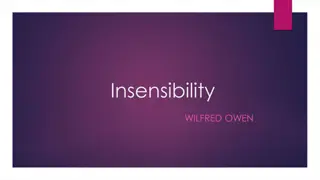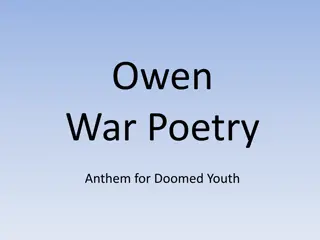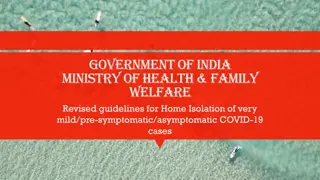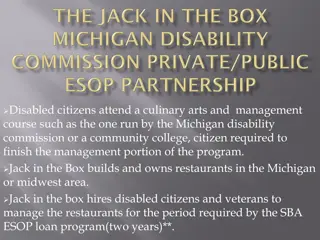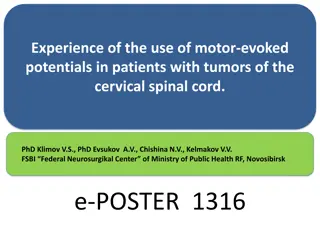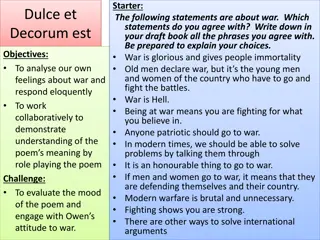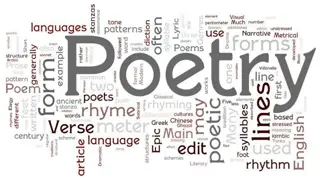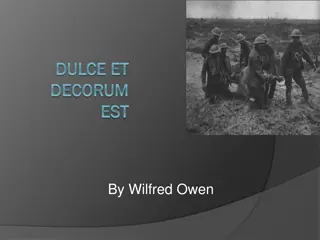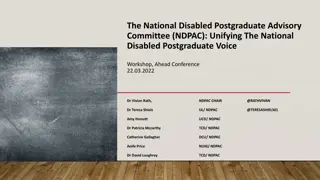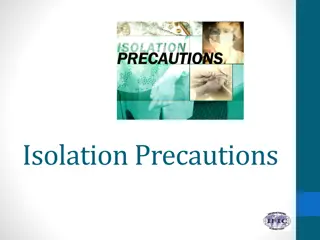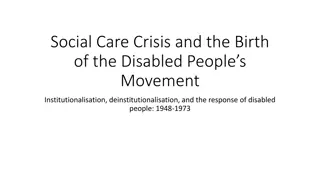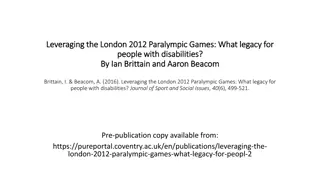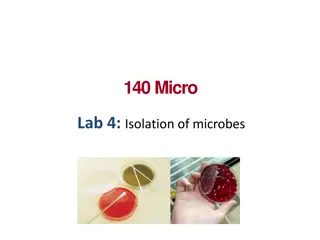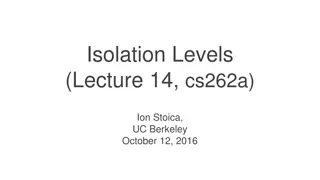Sympathy Evoked in Owen's "Disabled" Through Juxtaposition and Isolation
In Wilfred Owen's poem "Disabled," sympathy for the wounded soldier is evoked through juxtaposition of past and present, the attitude of women, physical emasculation, and isolation. The poet paints a vivid picture of a young man's loss and isolation, highlighting the contrast between his past heroic image and current reality. Through powerful imagery and themes, Owen elicits a deep sense of empathy for the soldier's plight.
Download Presentation

Please find below an Image/Link to download the presentation.
The content on the website is provided AS IS for your information and personal use only. It may not be sold, licensed, or shared on other websites without obtaining consent from the author. Download presentation by click this link. If you encounter any issues during the download, it is possible that the publisher has removed the file from their server.
E N D
Presentation Transcript
+ How does Owen evoke sympathy for the wounded soldier in Disabled Sunday, 22 September 2024 jonathan Peel JLS 2014
+ Disabled He thought he d better join. He wonders why. He sat in a wheeled chair, waiting for dark, Someone had said he d look a god in kilts, And shivered in his ghastly suit of grey, That s why; and maybe, too, to please his Meg; Legless, sewn short at elbow. Through the park Aye, that was it, to please the giddy jilts Voices of boys rang saddening like a hymn, He asked to join. He didn't have to beg; Voices of play and pleasures after day, Till gathering sleep had mothered them from him. Smiling they wrote his lie; aged nineteen years. Germans he scarcely thought of; all their guilt, About this time Town used to swing so gay And Austria s, did not move him. And no fears When glow-lamps budded in the light-blue trees, Of Fear came yet. He thought of jewelled hilts And girls glanced lovelier as the air grew dim For daggers in plaid socks; of smart salutes; In the old times, before he threw away his knees. And care of arms; and leave; and pay arrears; Now he will never feel again how slim Esprit de corps*; and hints for young recruits. Girls waists are, or how warm their subtle hands; And soon he was drafted out with drums and cheers. All of them touch him like some queer disease. jonathan Peel JLS 2014
+Possible approach Replace How with What By what means does he evoke sympathy? Juxtaposition of past and present Attitude of women Physical emasculation Isolation 4 is enough for this essay you might find more. jonathan Peel JLS 2014
+Then locate the elements in the poem Voices of boys and mothering to recall what is missing Juxtaposition of past and present Some Look a god in kilts accentuates the loss of legs cheered him home irony of treatment when not a real hero Town swung so gay and glow lamps budded. Blood smear seemed brave and heroic. Not now jonathan Peel JLS 2014
+Attitude of women Joined up to impress and was encourage d to do so Never feel how slim all of them touch him like some queer disease Mothered them his parents are absent in this poem. Women s eyes pass from him to men that were whole His meg WHY DON T THEY COME? jonathan Peel JLS 2014
+Physical emasculation In his wheele d chair Sown short at elbow Back will never brace Now, he is old Threw away his knees Poured out his colour Spend a few sick years in institutes Leap of purple spurted from his thight jonathan Peel JLS 2014
+Isolation Through the park Ghastly suit of grey, waiting for DARK Esprit de corps joined up to be part of a group Only a solemn man enquired about his soul How cold and late it is Why don t they come? jonathan Peel JLS 2014
+Now move to HOW? And look at language choices Remember that no word in accidental and that Owen edited hard to ensure the correct choice of word for each occasion You should look for typical devices used: Metaphor, Simile, juxtaposition, rhyme and pararhyme, repetition as well for the key words. jonathan Peel JLS 2014
+ZOOMING IN When analysing, aim for this pattern: Point Evidence in the form of a quotation around 5 or 6 words might be ideal ANALYSIS: zoom into the key word and show me that you are able to explain why Owen chose it and what he was trying to achieve Relate this to the question Link and move on. jonathan Peel JLS 2014
+Like this Supported by a short quotation A clear point Owen highlights the drama of the moment that the soldier was wounded when he writes: leap of purple spurted from his thigh . Here the choice of the noun purple to replace blood is important since purple is a colour with connotations of royalty and high status. Owen is showing that this soldier, however anonymous, is a noble young man and deserving of our sympathy. The plosive of spurted serves to heighten the graphic nature of the wound which takes away his legs. The sympathy of the reader is further evoked by reference to him having thrown away Zoom in to a specif ic word jonathan Peel JLS 2014
+Other ideas to play with Imagery of colour: Purple for status/royalty Ghastly grey monochrome and hopeless. Echoes Ghostly Waiting for DARK euphemistic connotation of death Light blue trees ; suggestive of air, sky or freedom Lost his colour: euphemism for blood; encourages reader to visualise the red torrent. jonathan Peel JLS 2014
+Images of time before Glow lamps budded : Budded suggests hope of new beginnings, ironic give his loss of masculinity Half his lifetime lapsed : alliterative L to draw attention to the fact that just like his arm, his life has been cut in half. Smiling they wrote his lie : Army is complicit in his injury, but he is conscious that it was his decision. Smiling : humour or pleasure? Sleep mothered them from him: Sleep is kind and eventually spares him the pain of hearing the voices. Helps to accentuate the fact that there is no parent in his life now. Though he is still young! jonathan Peel JLS 2014
+The essay Not too long: around 1200 words Focus is AO2 i &iii: No context or link needed. Introduction is short, followed by 4 main areas of discussion as outlined above. Conclude by recapping paragraph topics Highest marks go to those who show independent thought processes. jonathan Peel JLS 2014


